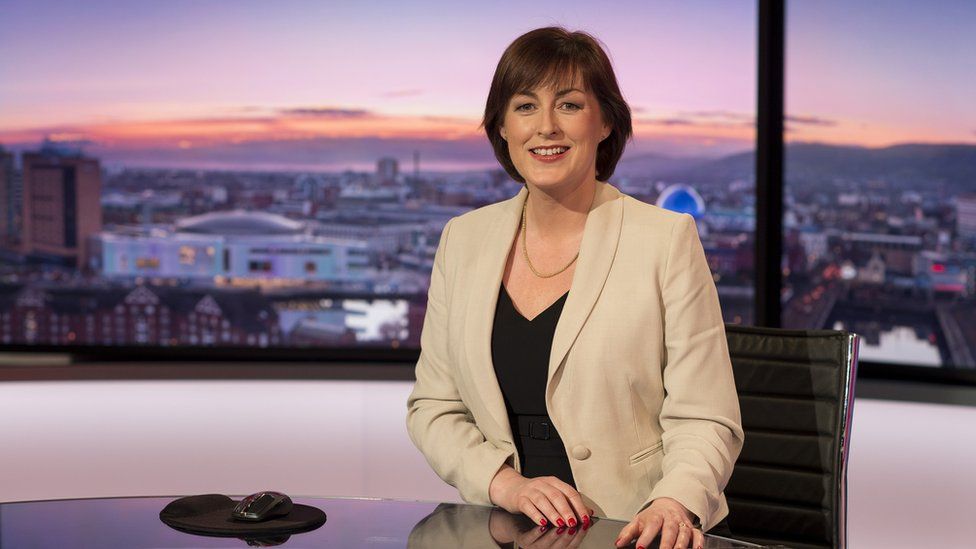
Donna Traynor says she faced discrimination on the basis of age, sex and disability
By Robbie Meredith
BBC News NI arts and education correspondent
Donna Traynor was treated in a manner that amounted to bullying and harassment by the BBC, an employment tribunal has heard.
Counsel for the former BBC Newsline presenter made the claim in his opening statement to the tribunal.
Ms Traynor alleges that she faced discrimination on the basis of age, sex and disability.
The BBC and its Northern Ireland director, Adam Smyth, are the respondents in the tribunal case.
Ms Traynor joined the BBC in 1989, presenting radio news bulletins before moving into television.
She worked for the corporation in Northern Ireland for more than 30 years and was one of its most high-profile presenters.
She announced she was leaving the BBC in November 2021 with immediate effect, in a post on social media.
Image source, Brian Lawless
BBC NI Director Adam Smyth arriving at the employment tribunal on Wednesday
At the time of Ms Traynor’s departure, Mr Smyth was the head of news in BBC Northern Ireland (NI).
He was appointed director of BBC NI in April 2023, after almost a year and a half as interim director.
In his opening statement to the tribunal, Ms Traynor’s counsel, Patrick Lyttle KC, said that she was a successful presenter who had always received positive appraisals for her work on BBC Newsline.
For instance, she had been praised for her “warmth and assurance” and “authority” in a number of formal appraisals.
In August 2006, Ms Traynor was offered a two-year contract presenting the 18:30 BBC Newsline programme five days a week.
In 2008, the three-person tribunal was told that she was given a permanent contract.
Mr Lyttle said that his client has been “engaged specifically to work on Newsline five days a week”.
‘Motivated by age’
But Mr Lyttle claimed that a plan by Mr Smyth to move Ms Traynor to present the Evening Extra programme on Radio Ulster alongside a male presenter was “suffused with sex discrimination”.
Mr Smyth proposed in late 2019 that Ms Traynor and Tara Mills should share presentation duties on BBC Newsline and Evening Extra on BBC Radio Ulster.
The tribunal heard a male presenter was to be recruited to present Evening Extra on a full-time basis alongside the two women, who would alternate as presenters.
Mr Lyttle said that Ms Traynor did not accept that plan and felt her five-days-a-week role on BBC Newsline was being “diminished”.
He also said Ms Traynor was “concerned this was being motivated by age”.
The tribunal was read notes of internal BBC meetings held about the change.
In them, Mr Smyth denied the proposed changes were anything to do with Ms Traynor’s age.
But Ms Traynor said she felt “interrogated” during some meetings.
‘Hanging her out to dry’
Ms Traynor subsequently raised a grievance with the BBC.
“I am 30 years with the BBC, I am shocked it has come to this,” she said at one meeting, according to notes read to the tribunal.
“The sense of team has gone out of the window, I feel ostracised.”
Mr Lyttle later claimed that the BBC had repeatedly questioned and ignored expert medical advice that Ms Traynor’s deafness in her left ear meant she was not suitable for radio presenting.
“They we’re hanging her out to dry,” he told the hearing.
“They backed her right into a corner, and they threatened her, they harassed her and they bullied her.
“They didn’t care, they wanted her into radio no matter what.
“If she didn’t want to go, she’s out.”
Mr Lyttle claimed that the BBC regarded Ms Traynor as an “risk editorially” due to her disability and removed her from TV presenting for two months in 2021.
“They were now ratcheting this up yet again,” Mr Lyttle said.








